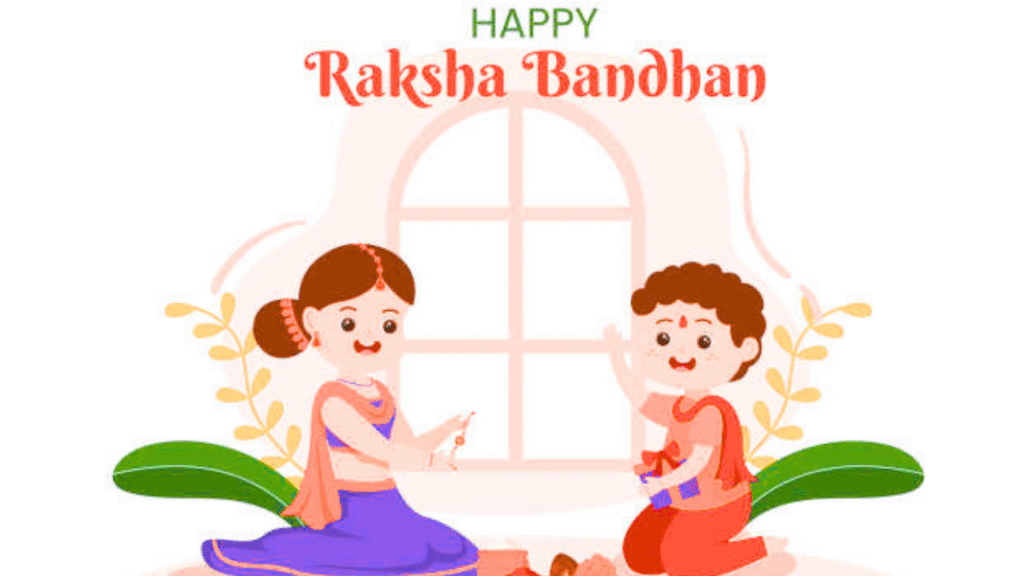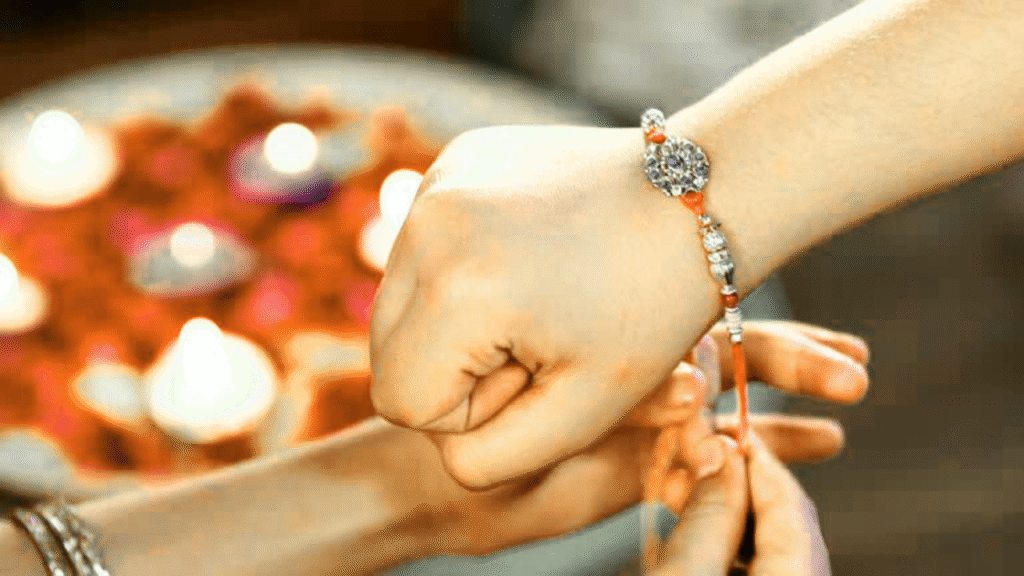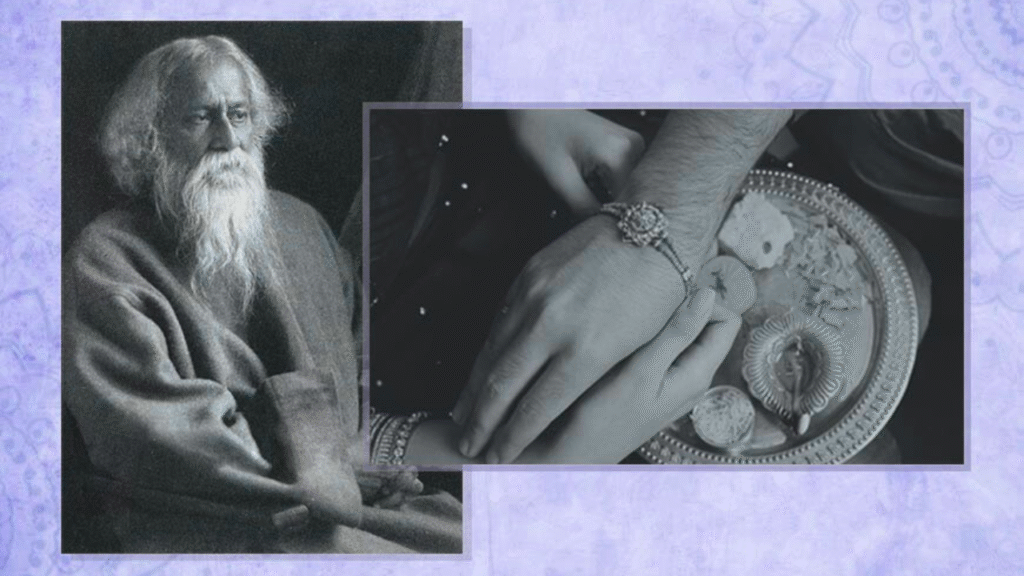Did you know that people outside of India also celebrate Raksha Bandhan? Hindus and few Sikhs also celebrate this lovely holiday of sibling love in Nepal, Mauritius, and even some regions of Pakistan. Raksha Bandhan was originally utilized as a symbol of protection and harmony outside of families, which is an incredible little-known fact. During the Bengal Partition in 1905, Nobel Laureate Rabindranath Tagore urged Muslims and Hindus to tie rakhis to one another as a sign of fraternity, encouraging unity over division. This demonstrates that Raksha Bandhan is a potent custom that may also represent social cohesion, harmony, and community safety. It is not simply about brothers and sisters.
Meaning of the Festival:
- The lovely Indian holiday of Raksha Bandhan honors the devoted relationship between siblings. In its own words, the term signifies “the bond of protection.” A sister shows her love and prayers for her brother’s health on this day by tying a rakhi, a festive thread, around his wrist. In exchange, the brother swears to protect her for the rest of her life and offers her a gift. It is more than only a custom; it is a sign of love, trust, and ongoing emotional support. Siblings are reminded of their unique role in each other’s life and family bonds are strengthened by this sincere custom.
Cultural Significance:

- In Indian culture, Raksha Bandhan is deeply significant. The emotional bond between siblings is what really matters, even though the gift-giving is a fun aspect of the celebration. It represents unwavering love, faith, and enduring accountability. The sister’s act of tying a rakhi is a sincere show of love and concern rather than merely a custom. The importance of shared responsibility and familial ties is reinforced by the brother’s pledge to keep her safe. This custom fortifies bonds and serves as a reminder to families of their responsibility to help one another. Raksha Bandhan is more than just a holiday; it is a magnificent representation of the fundamental Indian ideals of solidarity, deference, and emotional dedication.
Mythological Roots:

- Raksha Bandhan’s rich mythological heritage gives the celebration a deeper spiritual significance. One well-known tale is from the Mahabharata, in which Draupadi, moved by love and care, tore a piece of her sari to bandage Lord Krishna’s injured finger. Krishna was moved by her gesture and promised to always keep her safe. King Bali and Goddess Lakshmi are involved in another narrative. In order to bring her husband back, Lakshmi wrapped a rakhi around Bali’s wrist after Lord Vishnu promised to protect her realm. Bali gave her request after being moved by her love. These tales demonstrate how Raksha Bandhan is about love, dedication, and protection in all relationships, not just siblings, which lends the celebration a timeless and spiritual meaning.
Celebrated Across Religions and Regions:
- Despite being a Hindu holiday, Raksha Bandhan has gained popularity in many different religions and geographical areas due to its message of love and protection. The holiday is also celebrated in distinctive ways by Sikhs, Jains, and even some Buddhists. The “Rakhi” custom is called “Rakhardi” in Sikhism, signifying fraternity and togetherness. People of many faiths gather to commemorate the event in numerous parts of India, particularly in the north and west. Indian communities proudly continue the custom even overseas. This broad acceptance demonstrates how Raksha Bandhan has expanded beyond religious lines to stand for harmony, compassion, and common ideals.
Women Empowerment Angle:
- Despite its traditional roots, Raksha Bandhan subtly promotes women’s empowerment. It puts sisters in a strong emotional position where they are respected and promised safety and assistance for the rest of their lives. Rakhi tying is more than just a custom; it serves as a reminder that women should be protected, cared for, and treated with respect. In order to demonstrate that respect and safety are shared duties, women today also tie rakhis to friends, mentors, and even troops. This changing custom illustrates how Raksha Bandhan celebrates female strength while advocating for equality, trust, and emotional empowerment in the modern world.
Rabindranath Tagore’s Rakhi Movement:

- Rabindranath Tagore gave Raksha Bandhan a strong social significance during the British division of Bengal in 1905. Tensions between Muslims and Hindus were growing at the time. As a sign of fraternity and social harmony, Tagore urged people of many religions to tie rakhis to one another in order to foster togetherness and thwart division. By doing this, the event was elevated from a family custom to a platform for promoting peace and unity. Political barriers may not always be as strong as emotional ties, according to Tagore. His Rakhi Movement continues to stand as a testament to the power of love, respect, and solidarity to transcend division. It serves as a reminder that celebrations can be utilized to foster unity and create bridges within society.
Eco-Friendly Celebrations Rising:
- Rakhis that are handcrafted and environmentally friendly have become popular in recent years as a way for people to celebrate Raksha Bandhan. These rakhis are frequently biodegradable and constructed from natural materials like cotton, jute, or seeds. This change helps small companies and local artists while also reducing plastic trash. It’s a lovely approach to promote sustainable habits, be good to the environment, and honor tradition.
Global Reach:
- Beyond India’s boundaries, Raksha Bandhan is now observed globally wherever Indian populations call home. Every year, there are lively Raksha Bandhan festivities in nations including the United States, United Kingdom, Canada, Australia, and many more. Siblings communicate despite their distance from one another through meaningful texts, online rakhi delivery, and video conversations. This international event preserves cultural customs and fosters a sense of kinship among younger generations. It serves as a heartwarming reminder that family ties, love, and protection are limitless. Raksha Bandhan has evolved into a festival that brings people together from all over the world by fusing custom with contemporary means of communication.

